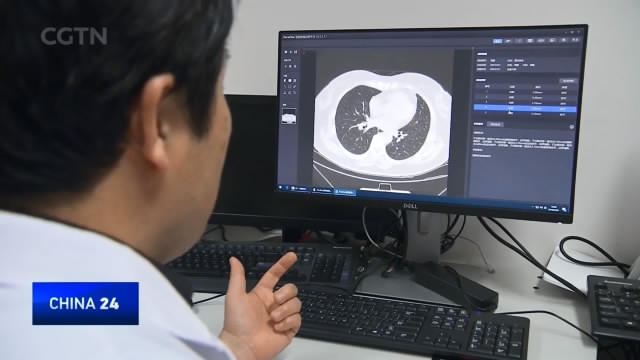
21:00, 26-Apr-2018
Artificial Intelligence: Chinese hospital uses cloud computation to improve diagnosis
02:52

Waiting for a medical diagnosis can often be just as nerve-wracking, if not worse, than waiting in line to see a doctor. Now, a hospital in China is using artificial intelligence to deliver speedy results to patients. CGTN's Ren Xueqian has the story.
What used to involve repetitive manual sorting through pages of lung scans can now be done in seconds as shown here. A team of radiologists at the Beijing Shijitan Hospital has loaded the set of lung scans into a computer to speed up screening. Through this, they can now speed up diagnosis and detect the early signs of lung cancer faster than before.
WANG RENGUI CHIEF RADIOLOGIST, BEIJING SHIJITAN HOSPITAL "My departments of 30 people see over 700 patients every day. This new software, Perebox, can probably do that in hours. It automates repetitive work that might've otherwise taken me longer to sort through. All I need to do is examine the scans for false positives. This gives me more time to attend to other patients and do research."
The new system was developed by a Beijing-based start-up called PereDoc. Shijitan will run all its lung scans past this new AI algorithm starting next month, in line with the nation's broader initiative to make more use of AI in the medical field.
REN XUEQIAN BEIJING "According to statistics by the International Data Center, China's annual spend on health-care is expected to reach a staggering 2 trillion dollars by 2025, making it the world's second largest health-care sector after the United States. With the government pushing for further digital integration in medicine, automation looks set to meet the needs of those seeking medical services as well as those providing it."
A recent IDC report also suggests China's market for AI health care services could reach over 900 million dollars in the next four years.
A rapidly-aging population continues to add pressure to an already strained health-care system. Crafting algorithms that can process medical images, such as CT scans and x-rays, can both lighten the workload for medical professionals, as well as improve the quality of diagnoses.
LIAN JING CEO, PEREDOC "What we've developed is a big data cloud computation system where through the combination of medical data and a self-learning AI algorithm, we can improve the efficiency and accuracy of imaging diagnosis. This can help doctors identify abnormalities faster and with higher accuracy, and patients can get their results back sooner."
PereDoc's latest invention has been installed in over 20 hospitals across China. And it's just one of the many examples of Chinese high tech companies that are currently investing in research and development in AI in medicine.
Last July, China's State Council announced plans that would propel spending of some 150 billion dollars in AI developments. The plan aims to make China the world leader in AI by 2030.

SITEMAP
Copyright © 2018 CGTN. Beijing ICP prepared NO.16065310-3
Copyright © 2018 CGTN. Beijing ICP prepared NO.16065310-3